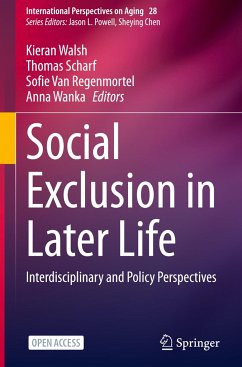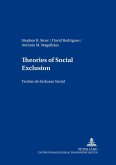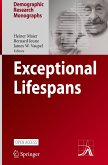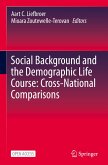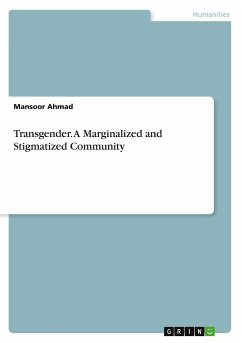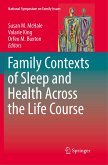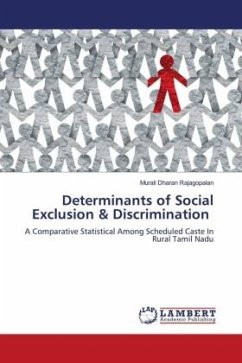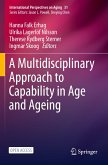Social Exclusion in Later Life
Interdisciplinary and Policy Perspectives
Herausgegeben:Walsh, Kieran; Scharf, Thomas; Van Regenmortel, Sofie; Wanka, Anna
Social Exclusion in Later Life
Interdisciplinary and Policy Perspectives
Herausgegeben:Walsh, Kieran; Scharf, Thomas; Van Regenmortel, Sofie; Wanka, Anna
- Gebundenes Buch
- Merkliste
- Auf die Merkliste
- Bewerten Bewerten
- Teilen
- Produkt teilen
- Produkterinnerung
- Produkterinnerung
Drawing on interdisciplinary, cross-national perspectives, this open access book contributes to the development of a coherent scientific discourse on social exclusion of older people. The book considers five domains of exclusion (services; economic; social relations; civic and socio-cultural; and community and spatial domains), with three chapters dedicated to analysing different dimensions of each exclusion domain. The book also examines the interrelationships between different forms of exclusion, and how outcomes and processes of different kinds of exclusion can be related to one another. In…mehr
Andere Kunden interessierten sich auch für
![Theories of Social Exclusion- Teorias de Exclusão Social Theories of Social Exclusion- Teorias de Exclusão Social]() Stephen StoerTheories of Social Exclusion- Teorias de Exclusão Social70,60 €
Stephen StoerTheories of Social Exclusion- Teorias de Exclusão Social70,60 €![Exceptional Lifespans Exceptional Lifespans]() Exceptional Lifespans38,99 €
Exceptional Lifespans38,99 €![Social Background and the Demographic Life Course: Cross-National Comparisons Social Background and the Demographic Life Course: Cross-National Comparisons]() Social Background and the Demographic Life Course: Cross-National Comparisons38,99 €
Social Background and the Demographic Life Course: Cross-National Comparisons38,99 €![Transgender. A Marginalized and Stigmatized Community Transgender. A Marginalized and Stigmatized Community]() Mansoor AhmadTransgender. A Marginalized and Stigmatized Community15,95 €
Mansoor AhmadTransgender. A Marginalized and Stigmatized Community15,95 €![Family Contexts of Sleep and Health Across the Life Course Family Contexts of Sleep and Health Across the Life Course]() Family Contexts of Sleep and Health Across the Life Course82,99 €
Family Contexts of Sleep and Health Across the Life Course82,99 €![Determinants of Social Exclusion & Discrimination Determinants of Social Exclusion & Discrimination]() Murali Dharan RajagopalanDeterminants of Social Exclusion & Discrimination59,99 €
Murali Dharan RajagopalanDeterminants of Social Exclusion & Discrimination59,99 €![A Multidisciplinary Approach to Capability in Age and Ageing A Multidisciplinary Approach to Capability in Age and Ageing]() A Multidisciplinary Approach to Capability in Age and Ageing30,99 €
A Multidisciplinary Approach to Capability in Age and Ageing30,99 €-
-
-
Drawing on interdisciplinary, cross-national perspectives, this open access book contributes to the development of a coherent scientific discourse on social exclusion of older people. The book considers five domains of exclusion (services; economic; social relations; civic and socio-cultural; and community and spatial domains), with three chapters dedicated to analysing different dimensions of each exclusion domain. The book also examines the interrelationships between different forms of exclusion, and how outcomes and processes of different kinds of exclusion can be related to one another. In doing so, major cross-cutting themes, such as rights and identity, inclusive service infrastructures, and displacement of marginalised older adult groups, are considered. Finally, in a series of chapters written by international policy stakeholders and policy researchers, the book analyses key policies relevant to social exclusion and older people, including debates linked to sustainable development, EU policy and social rights, welfare and pensions systems, and planning and development. The book's approach helps to illuminate the comprehensive multidimensionality of social exclusion, and provides insight into the relative nature of disadvantage in later life. With 77 contributors working across 28 nations, the book presents a forward-looking research agenda for social exclusion amongst older people, and will be an important resource for students, researchers and policy stakeholders working on ageing.
Produktdetails
- Produktdetails
- International Perspectives on Aging 28
- Verlag: COST Association / Springer / Springer International Publishing / Springer, Berlin
- Artikelnr. des Verlages: 978-3-030-51405-1
- 1st ed. 2021
- Seitenzahl: 480
- Erscheinungstermin: 31. März 2021
- Englisch
- Abmessung: 241mm x 160mm x 32mm
- Gewicht: 825g
- ISBN-13: 9783030514051
- ISBN-10: 3030514056
- Artikelnr.: 59485637
- Herstellerkennzeichnung
- Springer Nature c/o IBS
- Benzstrasse 21
- 48619 Heek
- Tanja.Keller@springer.com
- International Perspectives on Aging 28
- Verlag: COST Association / Springer / Springer International Publishing / Springer, Berlin
- Artikelnr. des Verlages: 978-3-030-51405-1
- 1st ed. 2021
- Seitenzahl: 480
- Erscheinungstermin: 31. März 2021
- Englisch
- Abmessung: 241mm x 160mm x 32mm
- Gewicht: 825g
- ISBN-13: 9783030514051
- ISBN-10: 3030514056
- Artikelnr.: 59485637
- Herstellerkennzeichnung
- Springer Nature c/o IBS
- Benzstrasse 21
- 48619 Heek
- Tanja.Keller@springer.com
Kieran Walsh is Professor of Ageing & Public Policy and Director of the Irish Centre for Social Gerontology, National University of Ireland Galway. Prior to taking up this role in 2018, he served as Project Director of Project Lifecourse within the Institute for Lifecourse and Society, a programme of work dedicated to capturing the lived experiences of children and youth, older people and people with disabilities in urban neighbourhoods. Kieran's research interests include: social exclusion in later life; the mediating role of public and social policy; place and life-course transitions; and informal and formal infrastructures of care. Kieran is Chair of the European COST Action CA15122 on `Reducing Old-Age Social Exclusion¿, which comprises over 180 members from 41 different countries. Thomas Scharf is Professor of Social Gerontology in the Population Health Sciences Institute and Co-Director of the Centre for Ageing & Inequalities at Newcastle University. He joined Newcastle in 2016, having previously been Director of the Irish Centre for Social Gerontology, NUI Galway. Tom is a Fellow of the UK Academy of Social Sciences and holds visiting professorships at NUI Galway and Keele University. He is President of the British Society of Gerontology (until 2022). Tom is Vice Chair of the European COST Action CA15122 on `Reducing Old-Age Social Exclusion¿. Tom¿s research addresses issues relating to social inclusion and exclusion in later life, often with a focus on the spaces and places in which inclusion and exclusion arise and on the policy responses to forms of exclusion. Sofie Van Regenmortel received her master¿s degree in Adult Educational Sciences (Agogische Wetenschappen) from the Vrije Universiteit Brussel (VUB) in 2013. In October 2013 she started working at the Department of Adult Educational Sciences at the VUB, became a member of the Belgian Ageing Studies (BAS) research group and started her PhD research on social exclusion in later life, which she successfully completed in September 2017. Together with her supervisor, prof. dr. Liesbeth De Donder, she was part of the European project `WeDO2! For the well being and dignity of older people¿ (2013-2015). In 2016 she joined the ROSEnet COST action on ¿Reducing Old-Age Social Exclusion: Collaborations in Research and Policy¿. Currently she is working for Statbel (Statistics Belgium) and remains involved in the BAS research as a voluntary research member. Anna Wanka studied Sociology and Law at the University of Vienna, Austria. From 2009 to 2016 she worked as a researcher at the Research Group ¿Family / Generations / Life Course / Health and Ageing¿ at the Department of Sociology in Vienna, where she was involved in various third-party funded projects, completed several international research fellowships and international teaching appointments. She completed her PhD in the field of environmental gerontology in December 2016. Since 2017 she is a postdoc researcher at the research training group ¿Doing Transitions¿ at Goethe University Frankfurt am Main, Germany. Her main research areas lie in the field of environmental and social exclusion in later life, life course transitions, technology and ageing, as well as lifelong learning.
Chapter 1. Introduction: The intersection of ageing and social exclusion. Part I: Economic Exclusion.- Chapter 2. Introduction: Framing economic exclusion.- Chapter 3. Socio-demographic differences across welfare regimes in material deprivation in Europe among individuals aged 50 and older.- Chapter 4. Unemployment at 50 +: economic and psychosocial consequences.- Chapter 5. Coping mechanisms of older age divorced and widowed women to mitigate economic exclusion: A qualitative study in Turkey and Serbia.- Part II: Exclusion from Social Relations.- Chapter 6. Introduction: Framing exclusion from social relations.- Chapter 7. Exclusion from social relations among older people in Belgium and Britain: A cross-national exploration of similarities and differences taking a life-course and multi-level perspective.- Chapter 8. Revisiting loneliness and social isolation: Prevalence, predictors and policy Consequences.- Chapter 9. Conflicting relations, abuse and discrimination in older adults.- Part III: Exclusion from Services.- Chapter 10. Introduction: Framing exclusion from services.- Chapter 11. Old age exclusion from services in Romania and Slovenia in a European comparative perspective.- Chapter 12. Care services in Central and Eastern European countries and the Russian Federation: Exclusion and the roads of innovation.- Chapter 13. Receiving care in a digitised world: Social and economic aspects of exclusion of older people.- Part IV: Community and Spatial Exclusion.- Chapter 14. Introduction: Framing community and spatial exclusion.- Chapter 15. From theory to practice: Older people's exclusion in cities through the 'Ageing, Space and Exclusion' triangle.- Chapter 16- The relationship between place and life-course transitions in old-age social exclusion: A cross-country analysis.- Chapter 17. Ageing and caring in rural environments: Actors, policies and contexts addressing the social exclusion.- Part V: Civic Exclusion.- Chapter 18. Introduction: Framing communityand spatial exclusion.- Chapter 19. Reconceptualising exclusion from civic participation in later life: Towards a new research agenda.- Chapter 20. Cultural exclusion in old age: Developing a social-exclusion perspective on cultural participation.- Chapter 21. Sidestepping rights: An analysis of the intersection of human rights obligations and their practical implications among old age migrants.- Part VI: Interrelationships between Different Domains of Exclusion.- Chapter 22. Introduction: Framing exclusion interrelationships.- Chapter 23. Older people living in long-term care institutions: A case for the multidimensionality of social exclusion.- Chapter 24. Two dimensions of social exclusion: Economic deprivation and dynamics of loneliness in later life in Europe.- Chapter 25. Effects of reversed mobilities on old-age social exclusion or inclusion in mountains territories: The case study of two alpine territories in France and Italy.- Chapter 26. Transport: A social institution supporting good ageing and inclusion in late life.- Chapter 27. Homelessness trends in ageing literature in the context of domains of social exclusion.- Part VII: Policy and Social Exclusion in Later life.- Chapter 28. Introduction: Framing social exclusion amongst older people in policy.- Chapter 29. Inclusion of older people and ageing in Agenda 2030 for Sustainable Development: The potential, the issues and the challenges.- Chapter 30. Pensions policies. Chapter 31. Social policy for older people in the post-Soviet space: A shift from social democratic to liberal approaches?.- Chapter 32. Inclusion of nursing home residents in city life through urban planning and architecture?.- Chapter 33. Old age digital exclusion as a policy challenge in Estonia and Finland.- Chapter 34. Social exclusion in older age and the EU pillar on social rights.- Chapter 35. Conclusion: The intersection of ageing and social exclusion.
Chapter 1. Introduction: The intersection of ageing and social exclusion. Part I: Economic Exclusion.- Chapter 2. Introduction: Framing economic exclusion.- Chapter 3. Socio-demographic differences across welfare regimes in material deprivation in Europe among individuals aged 50 and older.- Chapter 4. Unemployment at 50 +: economic and psychosocial consequences.- Chapter 5. Coping mechanisms of older age divorced and widowed women to mitigate economic exclusion: A qualitative study in Turkey and Serbia.- Part II: Exclusion from Social Relations.- Chapter 6. Introduction: Framing exclusion from social relations.- Chapter 7. Exclusion from social relations among older people in Belgium and Britain: A cross-national exploration of similarities and differences taking a life-course and multi-level perspective.- Chapter 8. Revisiting loneliness and social isolation: Prevalence, predictors and policy Consequences.- Chapter 9. Conflicting relations, abuse and discrimination in older adults.- Part III: Exclusion from Services.- Chapter 10. Introduction: Framing exclusion from services.- Chapter 11. Old age exclusion from services in Romania and Slovenia in a European comparative perspective.- Chapter 12. Care services in Central and Eastern European countries and the Russian Federation: Exclusion and the roads of innovation.- Chapter 13. Receiving care in a digitised world: Social and economic aspects of exclusion of older people.- Part IV: Community and Spatial Exclusion.- Chapter 14. Introduction: Framing community and spatial exclusion.- Chapter 15. From theory to practice: Older people's exclusion in cities through the 'Ageing, Space and Exclusion' triangle.- Chapter 16- The relationship between place and life-course transitions in old-age social exclusion: A cross-country analysis.- Chapter 17. Ageing and caring in rural environments: Actors, policies and contexts addressing the social exclusion.- Part V: Civic Exclusion.- Chapter 18. Introduction: Framing communityand spatial exclusion.- Chapter 19. Reconceptualising exclusion from civic participation in later life: Towards a new research agenda.- Chapter 20. Cultural exclusion in old age: Developing a social-exclusion perspective on cultural participation.- Chapter 21. Sidestepping rights: An analysis of the intersection of human rights obligations and their practical implications among old age migrants.- Part VI: Interrelationships between Different Domains of Exclusion.- Chapter 22. Introduction: Framing exclusion interrelationships.- Chapter 23. Older people living in long-term care institutions: A case for the multidimensionality of social exclusion.- Chapter 24. Two dimensions of social exclusion: Economic deprivation and dynamics of loneliness in later life in Europe.- Chapter 25. Effects of reversed mobilities on old-age social exclusion or inclusion in mountains territories: The case study of two alpine territories in France and Italy.- Chapter 26. Transport: A social institution supporting good ageing and inclusion in late life.- Chapter 27. Homelessness trends in ageing literature in the context of domains of social exclusion.- Part VII: Policy and Social Exclusion in Later life.- Chapter 28. Introduction: Framing social exclusion amongst older people in policy.- Chapter 29. Inclusion of older people and ageing in Agenda 2030 for Sustainable Development: The potential, the issues and the challenges.- Chapter 30. Pensions policies. Chapter 31. Social policy for older people in the post-Soviet space: A shift from social democratic to liberal approaches?.- Chapter 32. Inclusion of nursing home residents in city life through urban planning and architecture?.- Chapter 33. Old age digital exclusion as a policy challenge in Estonia and Finland.- Chapter 34. Social exclusion in older age and the EU pillar on social rights.- Chapter 35. Conclusion: The intersection of ageing and social exclusion.

